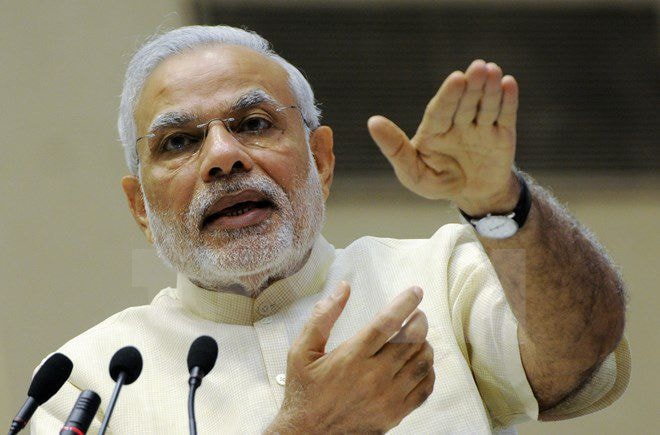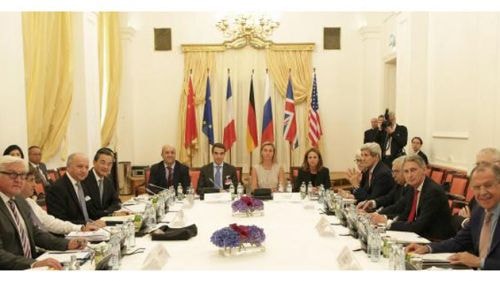Central Asia becomes the "navel" of the world!
(Baonghean) - Last week continued to be a week of many developments in the international relations axis with the focus on Central Asia. While Iran continued to be a "hot spot" with unfinished negotiations with the West, the cluster of countries belonging to the Soviet Union became a common destination on the Asian race track between India and China.
India wants to "open the way" to Central Asia
On Monday, July 6, Indian Prime Minister Narendra Modi began a tour of Central Asia with the aim of expanding India's influence and image on the international stage. The BRICS (Brazil, Russia, India, China, South Africa) summit held in Oufa, Russia last week was also an important move on Mr. Modi's chessboard.
 |
| Indian Prime Minister Narendra Modi. |
The first notable thing is that this is the first time an Indian leader has visited Uzbekistan, Kazakhstan, Turkmenistan, Kirghizistan and Tajikistan. After the collapse of the Soviet Union in 1991, India's interest in this region also decreased significantly, giving priority to its own rising economy. After that, the priority in India's foreign policy was given to the US, most clearly shown since 2000 when Mr. Modi's BJP came to power. Is "resetting" relations with the above five Central Asian countries the next inevitable step, especially in the context that China - India's rival in Asia - also does not ignore this region. Currently, the trade turnover between China and the above region has reached the threshold of 50 billion USD, far exceeding India's 1.4 billion USD.
On Tuesday, July 7, Mr. Modi traveled to Uzbekistan - the most populous country in Central Asia with 31 million people, and then, on Wednesday, July 8, to Kazakhstan - the richest country (GDP/capita reaching 13,600 USD) and also almost as large as India. In these two countries, Mr. Modi mentioned the issue of security as a reason to stand together and strengthen cooperation: "We live on the border of instability, right next to the cradle of extremism and terrorism. That is why we should strengthen cooperation in the field of defense and security, fight against terrorism with the strength of the common values that we share." Obviously, he was referring to the situation in Afghanistan and Pakistan, two countries that geographically separate India and Central Asia.
He also emphasized the cultural commonalities that Central Asia and India share, such as the values of “understanding, filial piety, compassion, love, devotion, and rejection of extremism.” At Kazakhstan’s Astana University, he declared: “Central Asia has had an influence on Indian and Islamic civilizations.” Surprisingly, a man who was raised in Hindu nationalism would invoke his “Islamic heritage” to express his desire to be closer to East Asian countries. To add a little more historical context, this is also the origin of the Mughals who ruled India for more than 300 years, until the British colonial conquest.
Not only in words, Mr. Modi has expressed his wishes through concrete actions such as signing with President of Kazakhstan Noursoultan Nazarbaiev a tentative framework agreement on bilateral exchanges in the field of information; many methods of cooperation in military training and joint participation in UN peacekeeping operations. At the same time, the two sides also discussed strengthening cooperation in the fields of nuclear energy and fuel energy - the strengths of a resource-rich region like Central Asia.
New Delhi even wants to go a step further, by joining the Achgabat agreement - to bring natural gas from Turkmenistan, through Iran and to the Gulf of Oman. This will be extremely important for the port strategy that India has cherished for 20 years, allowing it to enter Central Asia without having to go through the territory of the hostile country Pakistan. But that is still only a strategy for the near future, and in a more macro vision, what India is really aiming for is to compete with China - which is actively expanding its influence in the world and Central Asia is no exception.
Iran and P5+1 extend final deal again
So the July 10 deadline for a final agreement on the Iran nuclear issue has been missed, extended to July 13. However, this also means the risk of encountering additional obstacles in the process of reaching an agreement, for example from the US Congress.
 |
| Negotiators from Iran and the P5+1 group at a meeting in Vienna, Austria, on July 7. |
On Thursday, July 9, US Secretary of State John Kerry said the US and its P5+1 partners have no intention of compromising on a deal that would require them to make concessions to Iran. In return, a senior adviser to Iran’s supreme leader also stressed that Iran’s “red lines” must be respected.
In theory, the deadline for reaching an agreement is midnight on July 10. But if a final decision is not reached by 6 a.m., the Republican-led US Congress will have 60 days to review the submitted agreement, instead of the previous 30 days. The Obama administration has every reason to fear that doubling the approval deadline could topple the entire agreement.
While the US negotiating partners are facing a deadline, Iran has maintained a relatively tough stance, according to a statement by senior adviser Ali Akbar quoted by Iran's Tasnim news agency. Accordingly, Iran accused the US Secretary of State of making comments that contributed to "America's psychological warfare against Iran".
“We are here because we think we can make real progress,” US Secretary of State John Kerry said. “We are not in a hurry and we are not under any pressure.” This means that the possibility of Congress reviewing the deal within 30 days is almost impossible, and in the face of that scenario, Washington’s patience will be tested, but not indefinitely. “If important decisions are not made, we are absolutely willing to abandon the negotiation process,” Mr. Kerry did not specify how long that waiting period would be.
It seems that “no rush” is a phrase often used by both sides to assert their position at the negotiating table - a way to “keep the momentum” with the other side? On his Twitter, Iranian Foreign Minister Mohammad Javad Zarif made a similar statement: “We are working very hard, but not with the mindset of reaching an agreement at all costs.” An unnamed senior Iranian official also revealed to the press that at the last minute, the West was mainly responsible for not reaching an agreement on time: “Suddenly, each country set its own red lines. The UK has its own demands, the US has its own demands, then France, Germany,…”
However, in their most recent statements, Western leaders have continuously made positive statements about the negotiation process and expressed confidence that an agreement will be reached in the coming days. Perhaps that is what they should strive to achieve together, because within 2 weeks, Iran and P5+1 have extended the deadline more than once - which has increasingly undermined the international community's confidence in a completely successful negotiation process. And if it is achieved, is it certain that public opinion will not question the validity of this "infertile" agreement?
Thuc Anh
(According to Le monde)






